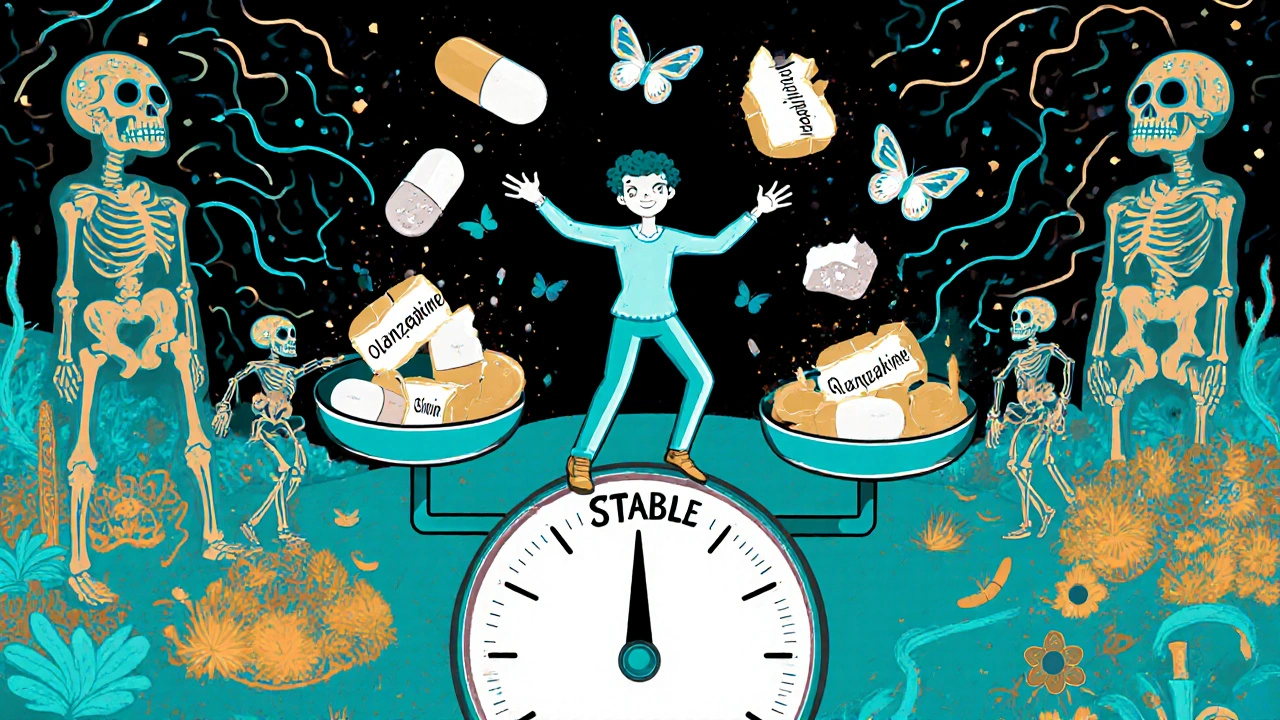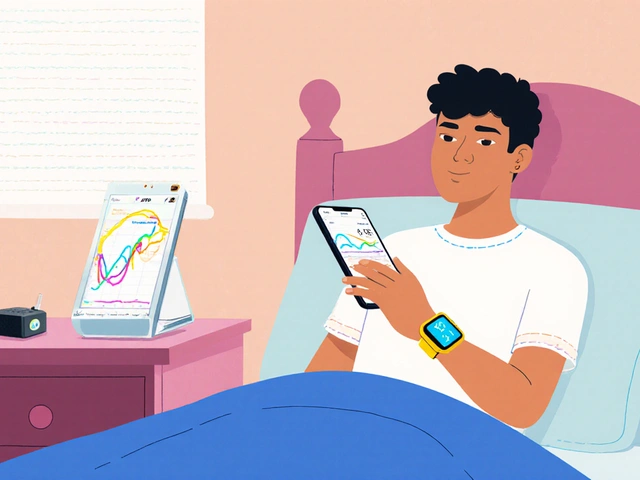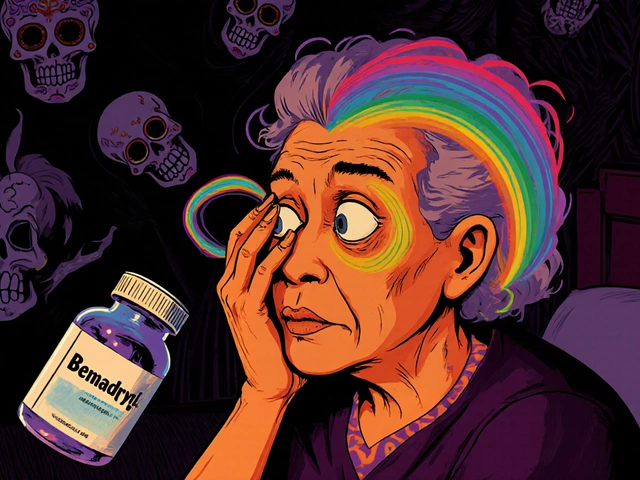
Many people don’t expect that a pill meant to help them could also make them gain or lose weight. But it’s more common than you think. About one in four prescription drugs in the U.S. can change your weight - sometimes without you realizing why. Whether you’re taking antidepressants, blood pressure meds, or diabetes drugs, your body might be reacting in ways your doctor never explained. The good news? You don’t have to just accept it. Understanding how these drugs work - and what to do next - can help you take back control.
Why Do Medications Change Your Weight?
It’s not just about eating more or moving less. Medications affect your body at a biological level. There are five main ways they cause weight changes:- Appetite stimulation: Some drugs, like mirtazapine or certain antipsychotics, mess with serotonin receptors in your brain. This makes you feel hungrier, even when you’re not. One study found that 78% of long-term SSRI users had reduced signals telling them they were full.
- Slowed metabolism: Beta-blockers like propranolol can lower your resting metabolic rate by 8-10%. That means you burn fewer calories just sitting still.
- Fluid retention: Steroids like prednisone cause your body to hold onto water. It’s not fat - it’s extra pounds you can lose quickly once you stop the drug.
- Increased fat storage: Diabetes drugs like pioglitazone activate receptors that turn more cells into fat cells. This can increase fat storage by 40-60%.
- Reduced movement: Antipsychotics often cause drowsiness. One study showed patients took 1,200 to 2,500 fewer steps a day - the equivalent of losing nearly a mile of walking every day.
These aren’t random side effects. They’re direct results of how the drugs interact with your biology. And the weight change isn’t always obvious at first. It creeps up slowly - a pound here, a few pounds there - until you notice your clothes don’t fit anymore.
Which Medications Cause Weight Gain?
Not all drugs affect weight the same way. Some are notorious for adding pounds, while others are surprisingly neutral - or even help you lose weight.Antidepressants:
- Mirtazapine: Causes 2-5 kg (4-11 lbs) gain in 6 months. It’s effective for depression and insomnia, but weight gain is common.
- Paroxetine (Paxil): Leads to 2.5-3.5 kg (5-8 lbs) gain over a year.
- Fluoxetine (Prozac) and bupropion (Wellbutrin): Often lead to slight weight loss. Bupropion users lost an average of 1.5-2.5 kg in clinical trials.
Antipsychotics:
- Olanzapine (Zyprexa): One of the worst offenders. Patients gain 4.5-6 kg (10-13 lbs) in just 10 weeks.
- Risperidone: Moderate gain - around 2-4 kg.
- Aripiprazole (Abilify): Nearly weight-neutral. Most users gain less than 1 kg.
Diabetes Medications:
- Insulin: Causes 2-4 kg (4-9 lbs) gain in the first year. It helps control blood sugar but stores excess glucose as fat.
- Sulfonylureas (e.g., glipizide): Similar to insulin - 3-4 kg gain expected.
- GLP-1 analogues (semaglutide, liraglutide): These actually help you lose weight. In trials, users lost 6-10 kg (13-22 lbs) over 6-12 months.
What’s surprising is how much difference there is even within the same class. Two antidepressants can have opposite effects. Two antipsychotics can be worlds apart. That’s why choosing the right one matters.
How Much Weight Do People Actually Gain?
Numbers can feel abstract. Here’s what real people experience:- On Reddit, one user gained 18 pounds in six months on sertraline - despite no changes in diet or exercise. They switched medications after talking to their psychiatrist.
- A patient on insulin lost 22 pounds after switching to semaglutide. Their blood sugar improved too.
- On Drugs.com, 68% of people taking olanzapine reported “significant weight gain” (over 10 pounds). Only 12% of those on liraglutide said the same - 82% reported meaningful weight loss.
These aren’t rare cases. The Obesity Medicine Association estimates that 15% of obesity cases in the U.S. are directly linked to medication use. And it’s not just about appearance - extra weight increases heart disease risk by 12-18% for every 5 kg gained, according to the Framingham Heart Study.
What’s worse? Many patients don’t know this is a possible side effect. A 2024 survey found only 38% of people were warned about weight changes before starting a new medication. That’s a gap in care - and it’s preventable.

What You Can Do: A Practical Plan
You don’t have to wait until you’ve gained 10 pounds to act. Here’s how to stay ahead:- Get a baseline. Before starting any new medication, record your weight and BMI. Take measurements - waist, hips, thighs - even if you don’t weigh yourself. These help spot trends.
- Ask about alternatives. If you’re being prescribed a drug known for weight gain, ask: “Is there another option with less risk?” For depression, bupropion may be better than mirtazapine. For psychosis, aripiprazole may be better than olanzapine.
- Use a risk tool. Doctors can use the Liverpool University Drug Interaction Group’s algorithm - validated in 2022 - to predict your personal risk based on your age, sex, current weight, and medication.
- Track monthly. Weigh yourself once a week at the same time of day. If you gain more than 2.5 kg (5.5 lbs) in the first 6 months, talk to your doctor. That’s the cutoff the Endocrine Society uses to trigger intervention.
- Don’t stop cold turkey. Never quit a medication without medical advice. If weight gain is a problem, your doctor can help you switch slowly or add a weight-friendly drug like metformin or GLP-1 agonists.
Some patients worry that switching meds will make their original condition worse. But studies show that when people switch to weight-neutral alternatives, their mental or physical health often improves - because they’re more active, sleep better, and feel better about their bodies.
What’s New in 2025?
The field is changing fast. In January 2024, the FDA started requiring drug labels to show weight change data in milligrams of active ingredient per kilogram of body weight. That means dosing is becoming more precise - and easier to predict.The biggest shift? Genetic testing. The Clinical Pharmacogenetics Implementation Consortium (CPIC) now recommends testing for HTR2C gene variants before prescribing antipsychotics. People with certain variants have a 79% higher risk of gaining weight. Knowing this ahead of time lets doctors choose safer options.
There’s also new tech: Noom’s MedWeight program, launched in early 2024, helps people on chronic meds manage weight. In a pilot study, users cut medication-related weight gain by 63%. And employers are taking notice - 58 of the top 100 U.S. companies now consider weight impact when deciding which drugs to cover.
The NIH’s $150 million Medication-Weight Initiative is funding research to develop 10 new weight-neutral drugs by 2029. This isn’t just about convenience - it’s about preventing obesity before it starts.

When to Talk to Your Doctor
You don’t need to wait until you’re struggling. If you’re on any of these drugs - and you’ve noticed changes in your weight, appetite, or energy - it’s time to speak up:- You’ve gained more than 5 lbs in 3 months.
- You’re feeling hungrier, even when you eat normally.
- You’re less active than before - even if you don’t feel tired.
- You’re avoiding social situations because of how your body looks.
- You’ve been told your blood pressure, cholesterol, or blood sugar is worsening.
Your doctor isn’t just treating your diagnosis - they’re treating your whole body. If they haven’t brought up weight yet, ask. Say: “I’ve noticed I’ve gained some weight since starting this. Is there a way to adjust this?”
Most providers want to help. But they need you to speak up. Only 63% of U.S. doctors currently consider weight when prescribing psychotropic drugs - up from 41% in 2018. Progress is happening, but it’s not universal.
Final Thoughts: You Have Power
Medications are tools - not life sentences. The right drug can save your life. But the wrong one can make it harder to live well. The goal isn’t to avoid all meds. It’s to choose the ones that work for you - body and mind.Weight changes from medication aren’t your fault. They’re a biological response. But you’re not powerless. With the right information, monitoring, and conversation with your provider, you can stay healthy - without sacrificing your treatment.
Ask questions. Track changes. Advocate for yourself. Your health is worth it.





There are 14 Comments
Rashmi Mohapatra
bro i took mirtazapine for 3 months and gained 18lbs like wtf i thought it was just me lmao
Abigail Chrisma
This is such an important post. So many people don’t realize meds can do this - and doctors rarely mention it. I switched from paroxetine to bupropion after gaining 12 lbs and honestly, my mental health improved *and* I started sleeping better. It’s not just about weight - it’s about quality of life.
Ask your doc about alternatives. You deserve to feel good in your body and your mind.
Meghan Rose
Actually, most of this is oversimplified. The studies cited? Tiny sample sizes. And nobody mentions that weight gain often correlates with improved mood - so if you’re eating more because you’re no longer depressed, is it really the drug or just recovery?
Also, GLP-1 agonists aren’t magic. They cause nausea, pancreatitis risk, and are absurdly expensive. But sure, let’s all just swap our meds for Ozempic.
Steve Phillips
Ohhhhh, so now we’re blaming pharmaceuticals for *everything*? Let me guess - next you’ll say my high cholesterol is because of Zoloft and not the 14 slices of pizza I ate last weekend?
And don’t get me started on this “genetic testing” nonsense - you want me to spit in a tube so Big Pharma can charge me $800 to tell me I’m predisposed to gaining weight? Meanwhile, my cousin on insulin lost 40 lbs by walking 5 miles a day and eating kale - but no, let’s just swap his meds for a $1000/month injection.
Stop infantilizing patients. You’re not a lab rat. You’re an adult. Eat less. Move more. Or stop complaining.
PS: If you’re on olanzapine and gaining weight… maybe don’t be on olanzapine. Duh.
Rachel Puno
YES. This is exactly what I needed to hear. I was terrified to bring up weight gain with my psychiatrist - felt like I was being selfish. But when I did? She immediately switched me to aripiprazole. Lost 11 lbs in 3 months and my anxiety didn’t come back.
You are NOT weak for caring about your body. You’re smart. Keep tracking. Keep asking. You’ve got this 💪
Clyde Verdin Jr
Okay but… what if the real problem is that we’re medicating normal human emotions?? 😭
Like… maybe you’re sad because your life sucks and not because your serotonin is low??
Also… who gave the FDA the right to decide what’s “weight-neutral”?? I’m not a number on a scale. I’m a soul. 🤡
Key Davis
While the content presented is largely accurate and well-referenced, it is imperative to emphasize that pharmacological interventions must be evaluated within the context of individualized patient care. The assertion that 15% of obesity cases are attributable to medication use, while statistically plausible, requires further longitudinal validation. Moreover, the recommendation to utilize genetic testing for HTR2C variants remains investigational outside of specialized psychiatric clinics. Clinical decision-making must remain anchored in evidence-based practice, patient autonomy, and shared decision-making protocols. The ethical obligation to inform patients regarding potential metabolic side effects is unequivocal and should be institutionalized across all prescriptive settings.
Cris Ceceris
I’ve been thinking a lot about this lately - like, why do we assume weight gain is always bad? What if it’s just the body trying to heal? I was on steroids after surgery and gained 15 lbs. Felt awful. But now I look back and realize my body was just storing energy to repair itself.
Maybe the problem isn’t the drug… maybe it’s how we’re taught to see our bodies as something to control instead of something to listen to.
Just a thought.
Brad Seymour
Love this breakdown. I’m from the UK and we don’t get told half this stuff here - my GP just handed me a script for sertraline and said ‘it might make you a bit sleepy’. No mention of the 10 lbs I’d gain. Thanks for the practical tips - gonna start tracking my waist size next week.
Also, Noom’s MedWeight program? That’s actually legit. My mate used it and said it was way more helpful than any diet app.
Malia Blom
So let me get this straight - you’re saying if I’m depressed and gain weight on antidepressants… it’s not my fault? But if I’m fat and on insulin? That’s just my laziness? Classic medical gaslighting wrapped in data.
Also, GLP-1 agonists are just the new diet pills for rich people. Meanwhile, poor folks are stuck with metformin and shame. How convenient.
And why is no one talking about how these drugs are prescribed to people who don’t even need them? Like… who decided sadness = chemical imbalance? Who even are these experts?
Erika Puhan
Statistical cherry-picking at its finest. 78% of SSRI users report reduced satiety? Where’s the control group? Who funded the study? And why are you ignoring the fact that weight gain correlates with improved appetite in treatment-resistant depression? This isn’t pharmacology - it’s fearmongering dressed as science.
Also, ‘genetic testing’? Please. You’re enabling medical narcissism. People don’t need to know their HTR2C variants. They need to eat less sugar and stop blaming Big Pharma for their poor life choices.
Edward Weaver
Let’s be real - this whole ‘meds cause weight gain’ thing is a liberal distraction. In America, we’ve got obesity because people eat fast food and sit on their asses. Not because of a pill.
And why are we letting foreign studies dictate our healthcare? The Framingham study? That’s 70 years old. The NIH’s $150M initiative? That’s taxpayer money wasted on woke science.
Stop making excuses. Get off the couch. And stop telling doctors what to prescribe.
Lexi Brinkley
OMG I’m so glad someone finally said this!! 😭 I was on olanzapine and gained 25 lbs in 4 months. No one warned me. I felt like a monster. Then I switched to Abilify and lost it all. I’m crying rn. 🥹💖 #MedicationAwareness #WeightNotMyFault
Kelsey Veg
lol i just googled ‘why do i keep gaining weight’ and this was the 3rd result. thanks for nothing
Write a comment
Your email address will not be published. Required fields are marked *